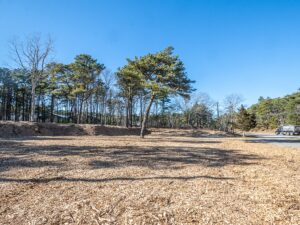TRURO — The town’s building commissioner and zoning board of appeals have been consistent over the last year in their position that Robert Martin’s bulk sale of landscaping material from the property at 100 Route 6 is prohibited. It’s an opinion that Martin and his Orleans-based attorney, William Henchy, don’t share.

It appeared that the question was settled on Nov. 6, however, when, after an appeal by Martin, the ZBA voted unanimously to uphold a cease-and-desist order issued by Building Commissioner Richard Stevens last spring.
The board ordered Martin to clear the property by Jan. 15. Martin complied and has cleared all materials from the lot — but that’s not the end of the story.
Martin leased the property from the Aiken family in January 2023 for his landscaping business, and by spring its footprint seemed to grow larger and flatter as concrete bays and piles of gravel appeared on the site. The property is in the National Seashore District, where commercial and industrial activities are limited to those that existed before the establishment of the Cape Cod National Seashore in 1961. Even those pre-existing businesses can’t be altered or expanded under federal rules. Towns in the Seashore have incorporated those rules in their local bylaws.
After the town was advised in a letter from then-Seashore Supt. Brian Carlstrom that Martin’s activities on the site were unlawful, Stevens issued his order in May 2023, saying Martin’s operation violated federal and local laws.
Following Martin’s appeal and the zoning board’s decision to uphold the order, however, the ZBA failed to file its decision with the town clerk within the 14-day deadline. Attorney Henchy seized the opportunity, saying the failure to file amounted to “constructive approval” of Martin’s appeal.
In Henchy’s opinion, that meant the cease-and-desist order restricting Martin’s operation was no longer in effect.
Henchy filed a notice of constructive approval with the town clerk on Nov. 21, one day after the board’s deadline had passed. On Nov. 22, the ZBA filed its decision, but that was two days too late, according to Henchy.
Dueling Court Cases
Both sides turned to the courts. On Dec. 6, Stevens filed a complaint in Barnstable Superior Court, seeking to have the constructive approval annulled and the zoning board’s Nov. 6 vote and decision affirmed.
Henchy filed a suit in state Land Court on Dec. 7, asking that the court to declare that Martin’s appeal was “constructively granted” and to annul the Nov. 6 decision of the zoning board.
Meanwhile, Stevens had issued a second cease-and-desist order against Martin on Nov. 29, which Henchy appealed to the zoning board.
On Feb. 26, the ZBA upheld Stevens’s Nov. 29 order following a heated exchange between Henchy and Barbara Carbone, Truro’s town planner and land use counsel.
Carbone repeatedly reminded ZBA members that the only matter before them was Martin’s appeal of the Nov. 29 order. The board was being asked to decide whether it upheld the order as of the time it was issued, Carbone said.
There should be no discussion of the “alleged” constructive approval, because that was pending in court, Carbone said.
Henchy bristled at Carbone’s use of “alleged,” saying the constructive approval was a fact.
He characterized Stevens’s second cease-and-desist order as an attempt at a “do-over.” Carbone disagreed, saying Henchy had questioned whether the zoning board had enforcement powers on the night of its original Nov. 6 vote.
Stevens issued the Nov. 29 cease-and-desist, Carbone said, “to make it clear the ZBA decision will be enforced.”
At Carbone’s suggestion, the board included all past records of the orders and appeals with its findings. Members then unanimously upheld the Nov. 29 cease-and-desist order.
“The board’s motion is such a transparent attempt to get another crack at the apple,” said Henchy, who made it clear he planned to appeal once again.



